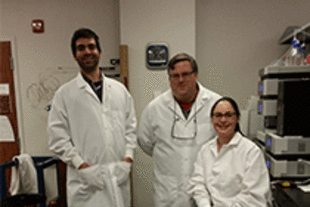My research is focused on the characterization of sulfur organic molecules (CHOS) in freshwater dissolved organic matter (DOM). During the first two years of doctorate I mainly analyzed DOM of various ecosystems with characteristic abiotic and biotic sulfur chemistry by means of ultra-high-resolution mass spectrometry (FTICR/MS).
To get a better insight into the formation of CHOS compounds, we are interested in the performance of model experiments. Since our research group is focused on the organic characterization of geochemical processes, we were fortunate to have contact with Prof. Gregory Druschel (Indiana University - Perdue University Indianapolis, (IUPUI)), who is an expert in the field of inorganic sulfur speciation in geochemistry.
Furthermore, the lab of my external thesis committee member, Prof. Michael Gonsior (University of Maryland Chesapeake Biological Laboratory) offers excitation emission matrix (EEM) fluorescence spectroscopy, another powerful technique for the characterization of DOM. Since the spectroscopic characterization of DOM for some of my samples became important and this technique also allows an even better interpretation of the model experiments, we decided to combine the two lab exchanges into one trip.
After a couple of video conferences and the organization of the lab exchange, I flew to Indianapolis in the beginning of November 2014 for a one month stay to perform model experiments with Prof. Greg Druschel and his graduate student Fotios Kafantaris and to learn the inorganic sulfur speciation methods. I was warmly welcomed by the whole department. I was able to network with many students and professors and experienced university research life in the United States. By the end of the month, I had the great opportunity to discuss my research with the experts in the field and to learn about even more methods then I had expected.
During my week at the Chesapeake Biological Laboratory I was able to measure all my samples and was introduced to new data analysis techniques. Furthermore, I had the opportunity to talk about my thesis and our joint research in detail.
Of course, I also had the great chance to explore the way of living in Indianapolis and Solomons (Maryland) during the Thanksgiving and Christmas season. The time passed by quickly and I am looking forward to finishing the data analysis and to continuing my experiments. Thank you HELENA for the support of my lab exchanges and the opportunity to work in a lab outside of Germany!


